#Dunanmunui
Explore tagged Tumblr posts
Text
🌺与那国島(どぅなんちま)がらぬ東盛あいかか゚作(っく)いわたる映画 『ばちらぬん』 や、十月(どぅーがち)迄(ばぎん)オンラインし見(ん)なりるん。▶ Bachiranun |JFF+ INDEPENDENT CINEMA 2023 (jpf.go.jp)
🌹Baciranun directed by Yonaguni islander Higashimori Aika is now available online (untill October). ▶ Bachiranun |JFF+ INDEPENDENT CINEMA 2023 (jpf.go.jp)

5 notes
·
View notes
Text
Thinking more about how the Ryukyuan archipelago is more like many ethnic-cultural groups with similar histories rather than one ethnicity. There's no perfect word but I appreciate that for now, Shimanchu has been used more frequently in place of Okinawan.
As a marginalized group within the sphere of Japan, I feel that we often lean towards seeing our own history through a rose-tinted glass. But the history of our place and space is complicated and the Ryukyuan Kingdom had acts of colonization to islands outside of Uchinaa.
I do find it frustrating that Uchinaaguchi is often referred to as “the Okinawan language” when Shimayumuta, Yambaru-Kutuba, Myaakufutsu, Yaimamuni, Shikamuni, Mēramuni, Teedanmuni, and Dunanmunui also exist? And in contemporary times, what does Uchinaaguchi standardization mean?
I can't speak to how it is in the islands but in the diaspora, I do feel that [we] Uchinaanchu don't really give as much space or conversation to other islands or don't acknowledge how Loochoo/Ryukyu/Uchinaanchu is not an identity that is accepted-used across our archipelago.
I am still in the process of learning and I am grateful to those within the community for sharing their truths, struggles and thoughts in language, identity, and history.
9 notes
·
View notes
Text
2022年12月9日
🌺今日やばーり。
🌹Today was quite erratic.
🌸今天真累人。
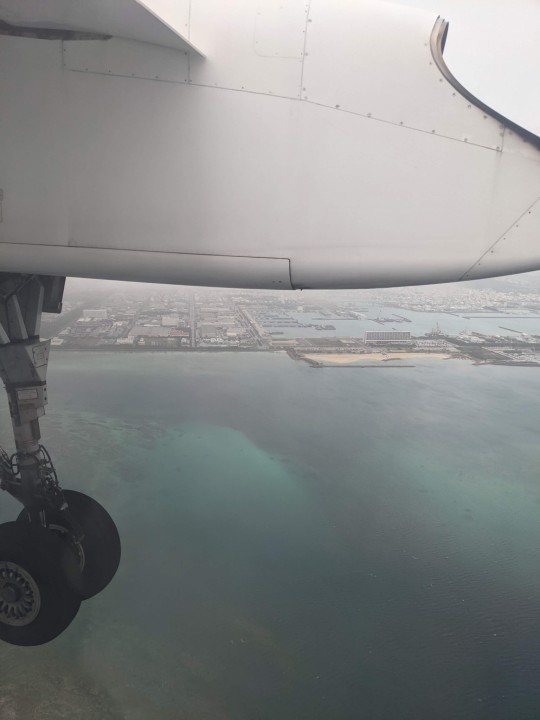
🌺今日や北風(にちかでぃ)吹てぃ、たたい居たん。
🌹The north wind was very strong today.
🌸今天颳北風,天氣非常不好。
🌺強(す)さる乱気流 / 風(かでぃ)ぬ為那覇(なは)んき戻たん。
🌹We had to return to Naha due to unstable weather conditions.
🌸由於強烈亂流的關係,我們不得不返回那霸。
🌺与那国島んき行らぬたん。
🌹I didn't make it to Yonagunijima today.
🌸今天沒有去與那國島。
🌺我か゚手んき入りたる物(むぬ)や其ぬマップどぅないぶる。
🌹The only memorabilia I got is this map.
🌸我唯一入手的紀念品就是這張地圖。
🌺異(い)な物(むぬ)。
🌹 Very disappointing.
🌸真是可惜。

#与那国語#与那国方言#yonaguni#dunanmunui#与那国#yonaguni language#どぅなんむぬい#okinawa#ryukyu#japan#沖縄の文化#沖縄#沖縄旅行#沖縄本島#与那国物言#与那国島#与那国町#與那國町#與那國語#與那國方言#與那國#與那國島#どぅなんちま#どぅなん#dunan munui#dunan#dunancima
13 notes
·
View notes
Text
2022年12月10日
🌺今日やすば屋(やー)にいびたてぃぬ沖縄(うんな)ぬ言葉し話きたん。
🌹I spoke some Uchinaaguchi at a そば restaurant today.
🌸今天我在一家沖繩そば屋裡講了一些沖繩語。
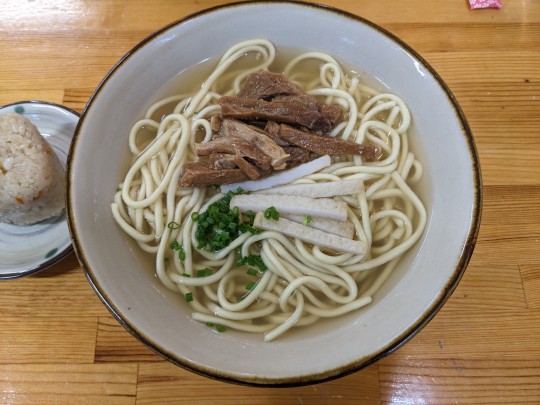
🌺沖縄ぬ言葉すんぎきらりるんでぃ言どぅ人達(っとぅんた)か゚多(うぶさ)ぐないてぃ、あらーぐ嬉ゃーなどぅあんすや。
🌹I am glad that more and more people are promoting Uchinaaguchi.
🌸能看到越來越多的沖繩人在推廣自己的母語,我真的很開心。
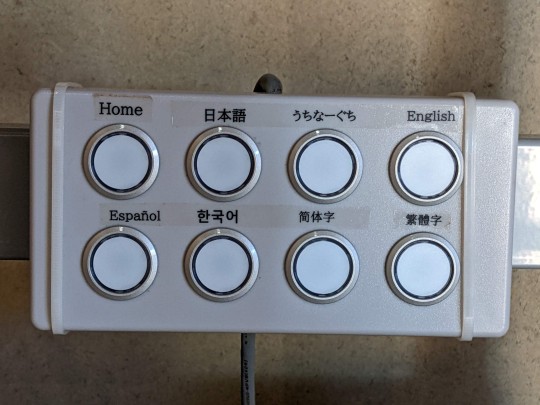
#与那国語#与那国方言#yonaguni#dunanmunui#yonaguni language#どぅなんむぬい#okinawa#ryukyu#japan#uchinaaguchi#uchinaa#沖縄語#おきなわ#沖縄の文化#沖縄方言#うちなーぐち
15 notes
·
View notes
Text
Japan’s forgotten language - Yonaguni/Dunan
The Yonaguni language (与那国語), better known as Dunanmunui (与那国物言), Dunan-munui, or Dunan language, often referred to simply as Dunan, is the indigenous language of Yonagunijima (与那国島), the westernmost island of Japan. As of 2013, it has approximately 400 speakers, the majority of whom are middle-aged or older.
In Japan, Dunan and other Luchuan languages (Ryukyuan languages) are often referred to as “dialects” despite being unintelligible to Standard Japanese or other mainland variants. This is becuause assimilation policies were introduced to Ryukyu Islands after the Imperial annexation, and speaking Japanese has since been mandatory. In the early 20th century, Hougen Fuda (方言札) or dialect cards were commoly used at schools in Okinawa to coerce students into speaking only Standard Japanese.
Today, children no longer learn Dunan as mother tongue in the home, and the language is at risk of falling out of use. In 2009, UNESCO labeled Yonaguni (Dunan language), along with 5 other Ryukyuan languages, as “endangered” in the UNESCO Atlas of the World’s Languages in Danger of Disappearing. According to UNESCO, these languages that carry the culture of Luchu (Ryukyu) are on the course of extinction by 2050.
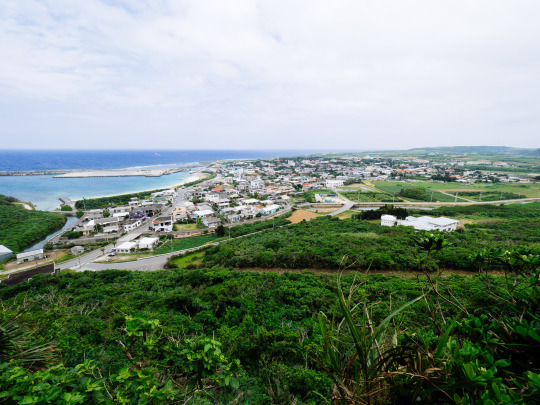
・Classification
1) The Ryukyuan languages form a branch of the Japonic language family.
2) In terms of internal relationships, the Ryukyuan languages are divided into two groups: Northern Ryukyuan languages and Southern Ryukyuan languages.
3) Yonaguni language (Dunanmunui) belongs to the Southern Ryukyuan languages, and it has two dialects: dialect of Tumaimura (祖納村ぬ言葉) and dialect of Ndimura (比川村ぬ言葉). However, most written sources generally do not stress on the two dialects of Dunan simply because differences between them are not salient in perception.
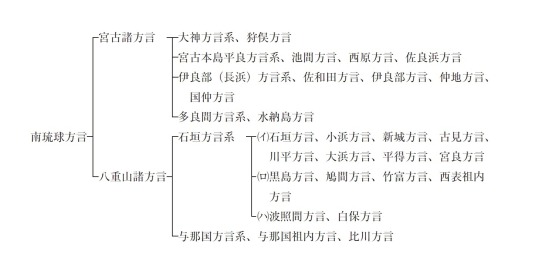
・Writing system
1) Japanese Hiragana and Katakana are used to write modern Dunanmunui, but currently there is no standardized orthography.
2) The most common one for Dunan is full Hiragana writing.
3) Similar to Uchinaaguchi (Okinawan language), it is possible to write Dunan in Kana-Kanji mixed script.
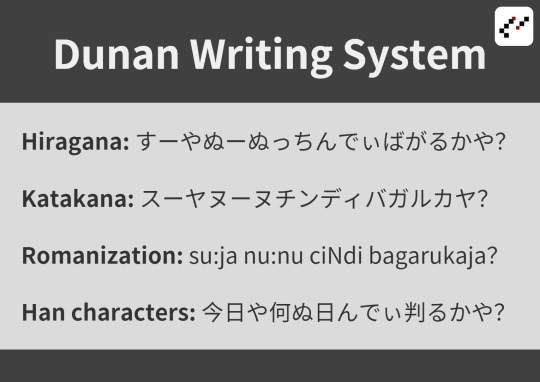
#Japan#Ryukyu#Japanese#Hougen#Language#indigenous#minority#Yonaguni#Dunanmunui#Dunan language#Dunan-munui#与那国語#与那国#琉球#琉球諸語#どぅなんむぬい#どぅなん#沖縄#Okinawa#Uchinaaguchi
291 notes
·
View notes
Photo

#与那国語#与那国#与那国方言#三線#Yonaguni#Yonaguni language#yonagunilanguage#dunan munui#Dunanmunui#Dunan language#Japan#Japonic#Ryukyu#okinawa#Langblr
32 notes
·
View notes
Text
A Glossary of Constitutional Terms in the Yonaguni Language
🌺大和(だまとぅ)ぬ憲法がら幾ちかぬ新言葉(あらくとぅば)習いんだぎ。
与那国物言(どぅなんむぬい)や今ぬ暮らし持(む)てぃに当(あ)たる言葉や物言方や無(み)ぬんか゚、宮良作さんとぅ宮良純一郎さんや、変ばる言葉組(く)み合(あ)してぃ、新(あたら)さる政治ぬ言葉作(っく)ゎん。
其ぬ道や与那国ぬ言葉しや非常にゆくあるんどー。
🌹Let's learn some new vocabulary from the Japanese constitution.
Yonaguni (Dunan) simply does not possess the vocabulary to express many modern concepts, but authors 宮良 作 and 宮良純一郎 managed to coined or developed new political terms by combining different existing words.
This methodology is, of course, very common in Yonaguni terminology.
🌸今天我們一起來從日本國憲法中學點新的單字。
與那國語本身沒有用於表達許多現代概念的詞彙,但本書的作者宮良作和宮原純一郎透過組合不同的詞來創造新的政治術語。
這種方法在現代與那國語詞彙中非常的常見。

語彙(ぐい)/ Vocabulary / 語彙
🌺道筋(みてぃすでぃ)- reason, principle 🌺睦まつぁん(むちまつぁん)- harmonious 🌺睦まさるん(むちまさるん)- to get along well 🌺人人間(っとぅにんぎん)- individual 🌺どぅぬ中(どぅぬなが)- society, world 🌺社会(しゃかい)- society 🌺関わり(かかわり)- relationship, relation 🌺企み(くるみ)- plan 🌺企び(たぐらび)- plan 🌺国(ふん)- country 🌺我達国(ばんたふん)- our country 🌺国ぬ民(ふんぬたみ)- the people, common people 🌺国ぬ形どぅきみひる力(ふんぬかたちどぅきみひるしから)- national sovereignty, the sovereignty of the people 🌺心んききみるん(くぐるんききみるん)- to make a resolution, to pass a resolution 🌺戦道具(いくつぁどぅく゚)- equipment, armed force, gear, weapons 🌺戦道具力(いくつぁどぅく゚しから)- war potential, force, strength, military power 🌺捨てぃひるん(かてぃひるん)- to give up, to relinquish 🌺国どぅ納みひる仕事(ふんどぅうさみるしかま)- national politics 🌺納みひる仕事(うさみるしかま)- politics 🌺意見(いきん)- opinion 🌺永遠(えいいん)- eternity 🌺強さる力(すさるしから)- authority, power, 🌺真高ぬ関係(まーだがぬかんけい)- equal relationship 🌺真丈ぬ関係(まーたぎぬかんけい)- equal relationship 🌺行ない(うぐない)- behavior 🌺確かとぅきみるん(しかとぅきみるん)- to define clearly 🌺使い働ぐん(かいはたらぐん)- to exercise power or authority
#与那国#与那国島#与那国語#与那国物言#与那国方言#与那国言葉#与那国ことば#どぅなんむぬい#沖縄#琉球#琉球の言葉#日本#日本国#Yoanguni#Yonaguni language#Dunan language#Dunanmunui#Dunan-munui#Dunan#dunan munui#yonaguni#yonagunilanguage#Yonagunigo
3 notes
·
View notes
Text
今ぬ旅や今日し終い
🌺今ぬ旅やあらーぐ面白(うむっつぁ)たん~
🌹This trip has been amazing, I had a lot of fun.
🌸這次在沖繩我玩得很開心。
🌺色(いる)々な所んき行てぃてぃ、色々な人とぅ話きてぃ、色々な旨(ま)る物ば食(は)い行たんどー
🌹I visited so many places, talked to different people, and tried different foods.
🌸我去了很多地方,跟不同的人講話,吃了各種美食。
🌺諸(むーる)ぬ事、我(あぬ)や忘(ばち)らぬんどー
🌹It is very memorable.
🌸非常的難忘。
🌺沖縄、行(ひ)るたよー、又来(またく)たよー
🌹I will definitely come again.
🌸沖繩,我一定會再來的。

#与那国語#与那国方言#yonaguni#dunanmunui#与那国#yonaguni language#どぅなんむぬい#okinawa#ryukyu#japan#琉球#旅行#沖縄本島#沖縄の文化#沖縄旅行#沖縄
4 notes
·
View notes
Text
沖縄ぬ赤瓦や宝
🌺沖縄(う��な)ぬ家建/建物や唐ぬ島や台湾ぬ家建んき似にぶんどー。
沖縄ぬ古(ふる)ちちぬ泥や金(かにん)どぅ多ぐ含みぶい、酸化現象し赤(あが)み染まるん。
🌹Architecture of Ryukyu resembles that of China and Taiwan.
Black clay soil from Okinawa that contains iron becomes red once it's oxidized.
🌸琉球建築和中國、臺灣的建築很類似。
沖繩黑土中所含的鐵因氧化而形成鮮明的紅色。
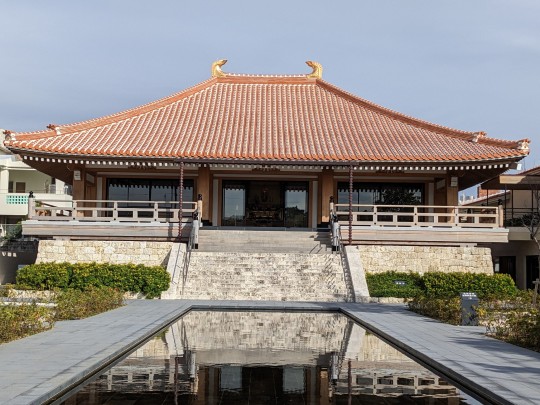

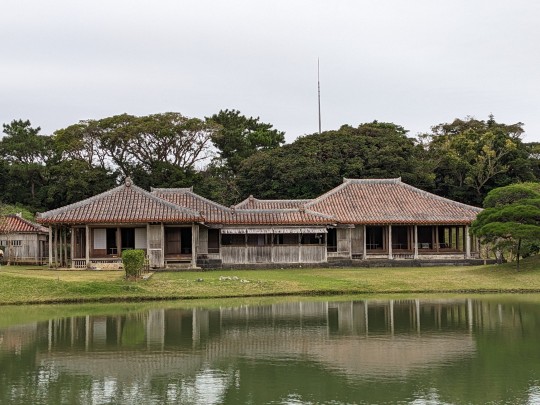
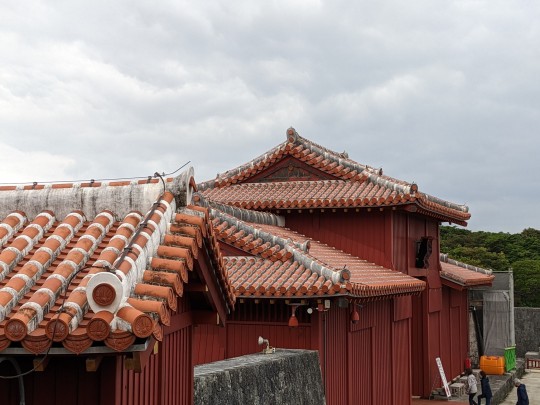


#沖縄#建物#Okinawa#Ryukyu#ryukyan architecture#architecture#与那国語#与那国方言#yonaguni#dunanmunui#与那国#yonaguni language#どぅなんむぬい#okinawa#ryukyu#japan
3 notes
·
View notes
Link
🔽トランスクリプト🔽
0:21 我(あ)か゚名(なー)やイチどぅない居(ぶ)る、小学校4年生
0:25 くまや同志(どぅち)ぬカイリとぅうとぅとぅぬセン
0:29 何時(いち)ん一緒(まどぅん)遊(あん)び居(ぶ)ん。
0:32 今日(すー)や祖納村(とぅまいむら)に居(ぶ)るイチや、何時(いち)ん与那国島(どぅなんちま)に何様(ぬーんに)ぬ暮(く)らしき居(ぶ)んでぃ一日(ひとぅい)たみ居(ぶ)んどー。
0:49 早朝(とぅむてぃ)6時(でぃ)に起(う)ぎ居(ぶ)んどー。未(ま)でぃ眠(に)んたんすや。
0:58 早朝(とぅむてぃ)かなでぃいる事(くとぅ)やラジオ体操。
1:01 与那国物言(どぅなんむぬい)し言(ん)でぃつるように習(なら)い居(ぶ)ん。
1:23 んー!あまてぃ目(みー)覚(さ)まん。
1:28 顔(っちら)洗(あら)いてぃ、早朝(とぅむてぃ)ぬ御飯(いー)食(ふ)ん
1:43 其(う)ぬ後(あとぅ)や、んーちみ歯(はー)磨(みが)きるん。
1:46 あさとぅあぶんき挨拶(あいさてぃ)きてぃがら、学校(がっく)んき行(ひ)るん。
1:52 学校(がっく)んき行(ひ)るんどー。
2:00 くみぬ早朝(とぅむてぃ)や、諸(むーる)しラジオ体操きるんどー。与那国物言(どぅなんむぬい)しゆ。
2:22 学校(がっく)終(う)わいてぃ、宿題きるん。
2:26 其(う)ぬ後(あとぅ)や習(なら)い事(ぐとぅ)。水曜日や空手(からてぃ)。
2:37 ウクレレ習(なら)い居(ぶ)ん。
2:45 休(だち)みぬ日(っちー)や、ひびだとぅ遊(あん)び。
2:51 チャンバラぬ竹(だぎゃ)遊(あん)び居(ぶ)ん。
2:56 大人(うぶっとぅ)がら習(なら)いてぃ、笛(ふい)ばぎん吹(ってぃ)知(っつ)ん。
3:13 あさ、あぶがら習(なら)い居(ぶ)る与那国物言(どぅなんむぬい)やあらーぐまち。
3:33 与那国物言(どぅなんむぬい)末(ま)びん上等(どぅーでぃ)ない欲(ぶ)さん。
3:39 夜(どぅる)7時(でぃ)に、まんぐるどぅさび御飯(いー)食(は)いてぃ、湯風呂(どぅふる)はやいてぃ、9時(でぃ)に眠(に)んどぅん。
3:52 明日(あった)や何(ぬー)きてぃ、遊(あん)ぶかや?憩(どぅぐ)いわり!
3:59 あらーぐ面白(うむっつぁ)る一日(ひっとぅい)あったえー。イチ、まーしくたみ取(とぅ)らし誇(ふが)らさゆ。まいふなあがみ!いた、又(また)明日(あった)がら意地(いでぃ)出(ん)でぃりゆ。
#与那国島#与那国語#与那国方言#与那国物言#どぅなんむぬい#どぅなん#與那國語#與那國方言#與那國#與那國島#Yonaguni#Yonaguni language#Dunanmunui#Dunan language#Dunan#Yonagunilanguage#langblr#language learning#endangered languages#language
6 notes
·
View notes
Text
針突ち (ハディチ)
🌺此ぬはでぃ、沖縄にん、異国にん、針突ちぬぐとぅ話きる人か゚多ぐないどぅ居る。
(舊字體: 此ぬはでぃ、沖繩にん、異國にん、針突ちぬぐとぅ話きる人か゚多ぐないどぅ居る。)
(ひらがな: くぬはでぃ、うんなにん、いくくにん、はでぃちぬぐとぅはなしきるっとぅか゚うぶさぐないどぅぶる。)
🌹We are seeing more and more people talking about Luchu's Hajichi (or hadiCi in Yonaguni) in both Luchu and abroad.
🌸最近無論是在沖繩還是在國外,關注針突 (沖繩刺青) 的人越來越多。
🔽与那国島ぬ昔がらぬ針突ちんた(与那国の歴史っか)🔽





#与那国方言#与那国語#yonaguni#dunanmunui#与那国#yonaguni language#ryukyu#okinawa#どぅなんむぬい#japan#langblr#minority languages#endangered languages#language learning
8 notes
·
View notes
Text
清明祭り
二月彼岸ぬ15日ぬ後や清明祭り(しーみまちり)どぅない居る。
此ぬ日や、家人数とぅ親類、諸し本家墓んき行い、親ぶでぃんき願か゚いつぁり、墓掃除きるんでぃ言どぅ習りか゚あんどー。
いるか゚、昔、清明祭りんでぃ言どぅんすや、親ぶでぃんきぬ祭り事やあらぬんき、晴明んでぃ言どぅ人どぅ島中ぬ人か゚拝み居るんでぃどぅあたるゆ。

#与那国方言#与那国語#yonaguni#dunanmunui#与那国#yonaguni language#ryukyu#okinawa#どぅなんむぬい#japan#okinawan#Okinawa#indigenous#luchu#endangered languages#minority languages#language learning#language#langblr
7 notes
·
View notes
Text
中秋
🌺与那国ぬ十五夜(どぅか゚や)んき当(あ)たる中秋ぬ日ぬ休み始まんど~
今年(くどぅち)ぬ十五夜や9月10日どぅない居る。
風吹(かでぃてぃ)来どぅ居る為月やんなにぬかん分がらぬん。
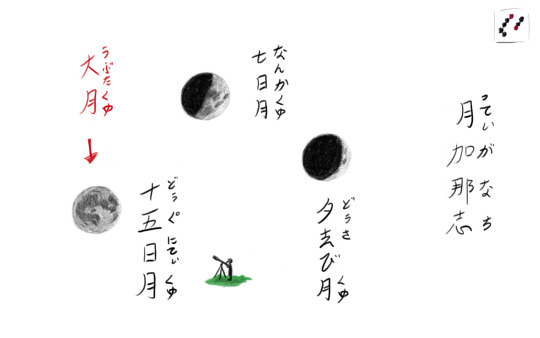
#与那国語#与那国方言#与那国物言#どぅなん#どぅなんむぬい#十五夜#yonaguni#yonagunilanguage#yonaguni language#dunanmunui#Dunan language
3 notes
·
View notes
Text
Yonaguni Kanji for dummies
・The basics - Kanji used in Luchu (Ryukyu)
1) Kanji (漢字) are logographic Chinese characters that are used in the Japanese and Luchuan (Ryukyuan) writing system.
2) Shuri Uchinaaguchi (Okinawan), the official language of the Luchu Kingdom (Ryukyu Kingdom), was historically written in hiragana-kanji mix.
3) Luchuan languages are often labelled as dialects, and because of this kana-kanji mix used in Luchuan languages has become obsolete.
・Yonaguni kanji (Dunan kanji)
1) Similar to both Japanese and Uchinaaguchi (Okinawan), it is possible to write Yonaguni using mixture of kanji and kana.
2) Currently there is no standardized Yonaguni orthography, and the modern Yonaguni writing system typically uses only Japanese Kana.
3) The book 與那國島圖誌 published in 1926 provides the earliest written account of Yonaguni Kanji.

• There are three types of Kanji reading existing in Yonaguni:
1) 音読み (on’yomi) - Sino-Japanese words pronounced using Yonaguni phonology. These words are associated with Chinese sounds and meanings.
道理(どぅり), related to 道理 (dàolǐ)in Chinese.
異国 (いくく), related to 異國 (yìguó)in Chinese.
2) 訓読み (kun’yomi) - The native reading of Yonaguni vocabulary with borrowed Kanji from Modern Japanese that represent their meanings. These are not cognates with any modern Japanese words.
一緒(まどぅん)
3) 琉訓 (ryu’kun) - Words that are cognates with Japanese. These words are also a type of kun’yomi because they are pronounced using Yonaguni phonology while they use borrowed Han characters to represent their meanings.
生ち虫(いちむし), related to いき and むし in Japanese.
町屋(みしや), related to まちや in Japanese
大和(だまとぅ), related to やまと in Japanese.
*It must be noted that since Yonaguni has no standardized writing system, sometimes a word may be written in more than one way. For example, 生ち虫 can be written as 動物 while they are both pronounced as いちむし. The latter one is, obviously, kun’yomi reading.
・Example
腹病どぅきりゃ医者ぬ家んき行てぃてぃ来たよ。
( ばただみどぅきりゃいさぬやんきいてぃてぃくたよ。 )
#与那国語#与那国方言#与那国#琉球語#琉球語の方言#どぅなん#どぅなんむぬい#沖縄#琉球#Yoanguni#Yonaguni language#Dunan#Dunan language#Dunanmunui#Dunan-munui#Ryukyu#Luchu#okinawa#Uchinaa#langblr#kanji#Japan
30 notes
·
View notes
Text
ばちらぬん - Baciranun
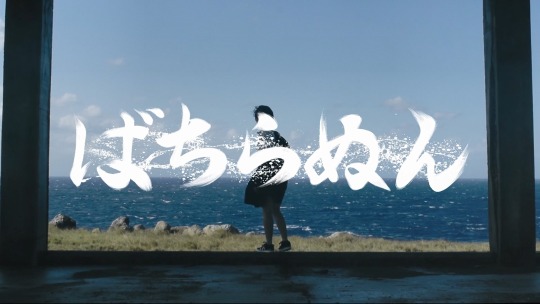
Baciranun (Yonaguni: 忘らぬん, Kana: ばちらぬん, lit. I won’t forget) is a 2020 Japanese-Ryukyuan documentary film written and directed by Aika Higamo and starring Aika Higamo, Nami Sasaki, Kenta Ishida, Koudai Mitsui, and Sakura Yamamoto. It is the first contemporary feature-length documentary in Yonaguni language. The film is set on Yonagunijima and revolves around a group of young people exploring various aspects of life and traditional culture of the island.
Baciranun premiered at the graduation exhibition of Kyoto University of the Arts and online on the official website of D STUDIO in February 2021, and it is scheduled to be released at Sakurazaka Theatre in Okinawa in October of the same year. The film received critical acclaim for its cinematography and was awarded Grand Prize at PIA Film Festival 2021.
ばちらぬん(漢字:忘らぬん)や、2021年に、与那国島ぬ生りぬ東盛(ひかしもり)あいかか゚作ゎる・出演きたる与那国物言ぬ映画どぅない居る。
大和ぬ一番西ぬ端にある与那国島ぬ言葉・文化・暮らし・祭んた描てぃどぅ居る。其ぬ映画や、第43回ぴあフィルムフェスティバル(PFF)にグランプリぬ褒美貰しゃん。
2022年四月三十日っか沖縄ぬ島ぬ桜坂劇場に上映きらりてぃ、五月七日がらや東京・K’s cinema、アップリンク吉祥寺、十三日がらやアップリンク京都、大阪・第七藝術劇場始み大和に公開きらりるん。
・Quotes
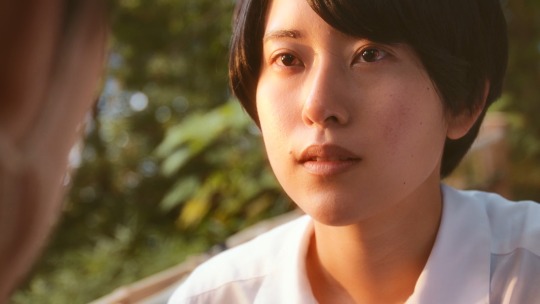
🌺俺とぅ貴方や全ん変ばるん。
(あぬとぅ んだや とぅーん かばるん。)
🌹You and I are completely different.
🌸我和你完全不一樣。
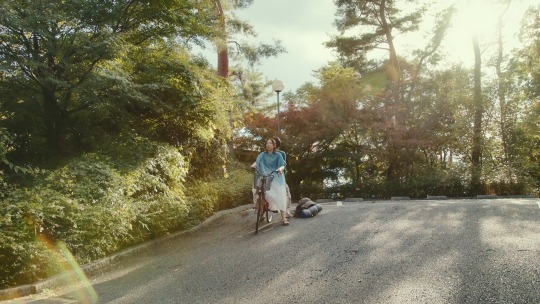
🌺俺や人間に生りてぃ、何ん分がらぬん。今此処生てぃ居る事、貴方とぅ話き居る事、今がらぬ先ぬ俺や覚い居るかや?
(あぬや にんぎんに まりてぃ、ぬーん ばがらぬん。ない くみ いてぃぶる くとぅ、んだとぅ はなしきぶるくとぅ、ないがらぬ さてぃぬ あぬや うぶいぶるかや?)
🌹I was born as a human, and I don’t understand anything. I wonder if I will remember living here and talking to you in the future.
🌸我生為人類,我甚麼都不了解。我在想未來的我到底能不能記得曾經住在這裡、與妳說話。
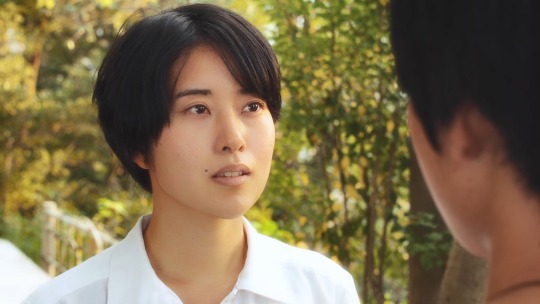
🌺何処迄、何時迄。
(んまばぎん、いちばぎん。)
🌹Anywhere, eternally.
🌸任何地方,永遠地。
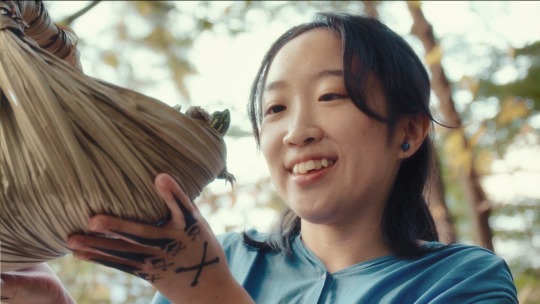
🌺でぃー、帰しんだぎ。
(でぃー、かいしんだぎ。)
🌹Let’s go home.
🌸我們回去吧。
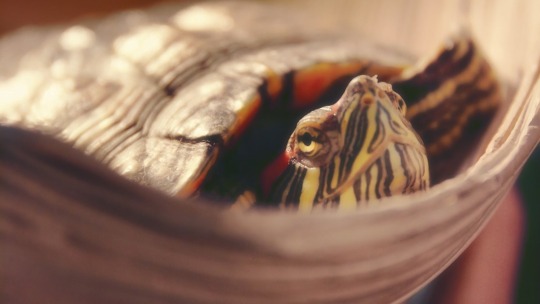
🌺道にや、穴ん石礫子んあんでぃ思むり。
(あみてぃにや、あなぷん いちぶぐてぃん あんでぃ うむり。)
🌹Think of the road with pits and pebbles.
🌸想著既有坑洞也有石礫的道路。
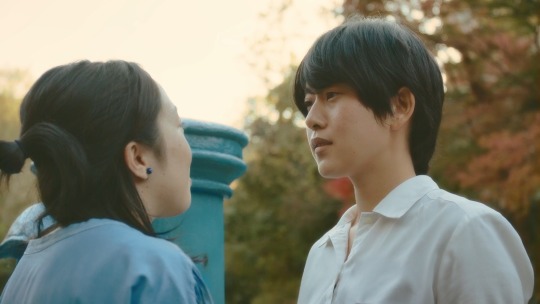
🌺俺や忘らぬんど、何にん此にん。
(あぬや ばちらぬんど、ぬーにん くにん。)
🌹I won’t forget everything.
🌸我不會忘記這一切。
・Sources
Baciranun. Directed by Aika Higamo, performances by Aika Higamo, Nami Sasaki, Kenta Ishida, Koudai Mitsui, and Sakura Yamamoto, D STUDIO, 2020.
法政大学沖縄文化研究所(1987)。琉球の方言: 八重山 - 与那国。東京都:法政大学沖縄文化研究所。
23 notes
·
View notes
Text
うちなーぐち会話帳
🌺俺か゚一番増ちゃるうちなーぐちぬ語学資料。😍
此や「阿蘭陀ーあたんてぃん大和人あたんてぃん沖縄んき来てぃ、言葉指し差し乍沖縄ぬ島人とぅ話どぅきらりるうちなーぐちぬ書物」どぅない居る。
いるか゚うちなーぐちや「方言」やあらぬんでぃ思い居ん。😐

(舊字體: 俺か゚一番增ちゃるうちなーぐちぬ語學資料。😍
此や「阿蘭陀ーあたんてぃん大和人あたんてぃん沖繩んき來てぃ、言葉指し差し乍沖繩ぬ島人とぅ話どぅきらりるうちなーぐちぬ書物」どぅない居る。
いるか゚うちなーぐちや「方言」やあらぬんでぃ思い居ん。😐)
🌹This is my favourite book for learning Uchinaaguchi (Okinawan). 😍
This book is designed for newcomers to communicate with locals. Even if you don't know the word, you can just point on the pictures in the book and show it to a native speaker.
But I personally don't think that Uchinaaguchi is a "dialect". 😐

🌸這是我最喜歡的沖繩語教材。 😍
無論你是日本人還是外國人,這本書非常適合那些想使用沖繩語和沖繩當地人溝通的學習者。對話過程中如果遇到較困難的部分,學習者亦可用手指著書內的圖片以消弭語言隔閡。
但我個人不認為沖繩語是一門「方言」。 😐
#与那国語#与那国#与那国方言#琉球語の方言#琉球語#沖縄語#うちなーぐち#沖縄#琉球#どぅなんむぬい#どぅなん#日本#アジア#Okinawa#Uchinaaguchi#Dunan#Dunanmunui#Dunan-munui#Yonaguni#Yonaguni language#Yonagunigo#Dunan language#Ryukyu#Luchu#Japan#langblr#Taiwan#Taiwanese
24 notes
·
View notes